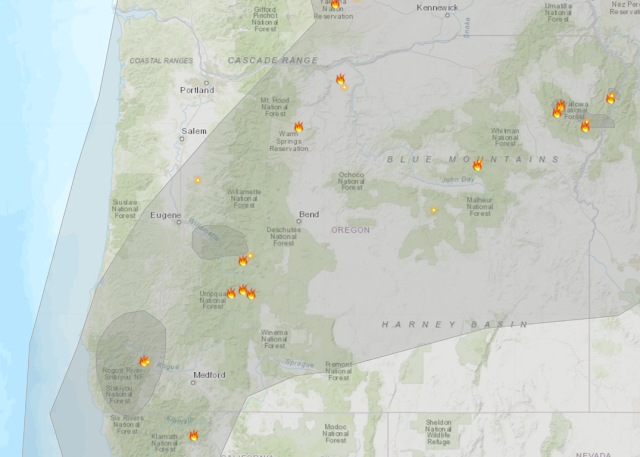Air quality advisory extended for Curry, Jackson, Josephine counties; intermittent smoke expected in Central and Northeastern Oregon
QUICK FACTS
Location:
Smoke source: Fires throughout Oregon
The Oregon Department of Environmental Quality extended an air quality advisory Thursday for Curry, Jackson and Josephine counties due to intermittent periods of heavy smoke from the Rum Creek Fire expected in the area for the foreseeable future.
DEQ also expects intermittent moderate to unhealthy smoke in Central and Northeastern Oregon through at least Tuesday due to localized impacts from nearby fires. This includes Wallowa, Baker, eastern Grant, Deschutes, eastern Lane, and southern Douglas counties.
Check Oregon’s daily smoke outlooks to see what times of day smoke might be better or worse in Southwest and Central Oregon.
Smoke levels can change rapidly depending on weather. Check current conditions on the Oregon Smoke Information Blog, DEQ’s Air Quality Index, or by downloading the free OregonAIR app on your smartphone.
Smoke can irritate the eyes and lungs and worsen some medical conditions. People most at risk include infants and young children, people with heart or lung disease, older adults and pregnant people.
Protect yourself and your family when smoke levels are high:
Additional resources:
Location:
- Advisory in effect for Curry, Jackson, Josephine counties.
- Smoke watch for Wallowa, Baker, eastern Grant, Deschutes, eastern Lane, and southern Douglas counties for intermittent smoke from nearby fires.
Smoke source: Fires throughout Oregon
The Oregon Department of Environmental Quality extended an air quality advisory Thursday for Curry, Jackson and Josephine counties due to intermittent periods of heavy smoke from the Rum Creek Fire expected in the area for the foreseeable future.
DEQ also expects intermittent moderate to unhealthy smoke in Central and Northeastern Oregon through at least Tuesday due to localized impacts from nearby fires. This includes Wallowa, Baker, eastern Grant, Deschutes, eastern Lane, and southern Douglas counties.
Check Oregon’s daily smoke outlooks to see what times of day smoke might be better or worse in Southwest and Central Oregon.
Smoke levels can change rapidly depending on weather. Check current conditions on the Oregon Smoke Information Blog, DEQ’s Air Quality Index, or by downloading the free OregonAIR app on your smartphone.
Smoke can irritate the eyes and lungs and worsen some medical conditions. People most at risk include infants and young children, people with heart or lung disease, older adults and pregnant people.
Protect yourself and your family when smoke levels are high:
- Stay inside if possible. Keep windows and doors closed. If it’s too hot, run air conditioning on recirculate or consider moving to a cooler location.
- Avoid strenuous outdoor activity.
- Use high-efficiency particulate air (HEPA) filters in indoor ventilation systems or portable air purifiers. Or create your own air purifying filter by following these instructions.
- Be aware of smoke in your area and avoid places with the highest levels.
- When air quality improves to moderate or healthy (yellow or green on the Air Quality Index), open windows and doors to air out homes and businesses.
- If you have a breathing plan for a medical condition, be sure to follow it and keep any needed medications refilled.
Additional resources:
- Find a cleaner air space in your area: Visit 211info.org and search for “Wildfire Related Clean Air Shelters.” Or call 211 any time or day.
- Learn more about protecting your health during wildfires
- Laura Gleim, DEQ public affairs, 503-577-3697, laura.gleim@deq.oregon.gov
- Local and Tribal contacts
